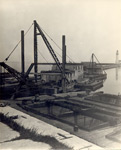Geneva Gazette (Geneva, NY), Oct. 7, 1812
- Full Text
We are informed that on
Friday morning last , about day break, the British ship of war,Royal George , came to anchor off the mouth ofGenesee river , sent her boats in, and cut out the schoonerLady Murray , (lately forfeited to government for a breach of the non-importation law) and the revenue cutter: - after towing them out of the river, they discovered that the Tackle and Apparel of the schooner was not on board of her, and immediately sent the boats back to Mr.Spalding 's Warehouse to demand the rigging, threatened to demolish the building if the request was not immediately complied with. The inhabitants of the village being entirely unarmed, were obliged to submit to their insolent demands. No depredations were committed on shore.On the preceding evening the Royal George had sent her boats into
Irondequoit Bay , mistaking it for the river, and discovering some men fishing, hailed them. The fishermen, understanding they were British and in want of a Pilot, extinguished their lights and made for the shore, upon which the British fired on them, & wounded one man in the arm. They pursued the fishermen a short distance into the woods, and one of their sailors finding himself on terra-firma, and under cover of the night, deserted from them. he states that the Capt. of the Royal George intended to make another visit, and endeavor to cut out some boats lying higher up the river. Some apprehensions are entertained for the boats lately sent fromOswego with arms and ammunition for our troops atNiagara ._____
From Cape Vincent.
In the night of the 20th inst.
Capt. Forsyth , with 70 of his rifle company and 34 militia men, embarked on board a number of boats atCape Vincent and went over to a small village calledGananoque , in the town ofLeeds , for the purpose of destroying the king's storehouse at that place. They landed unobserved, a short distance from the village, a little before sunrise on the morning of the 21st. but were soon after discovered and fired upon by a party of the British, consisting of about 125 regulars and militia.The Americans returned the fire with so much effect that the British retreated in disorder and were pursued to the village, where they again rallied, but soon finding the contest too warm for them they fled over a bridge and made their escape, leaving behind ten of their number killed (besides several who were seen to fall into the stream as they were fired upon when passing the bridge) and 8 regulars and a number of militia, prisoners.
Capt. Forsyth had only one man killed and one slightly wounded. The number of wounded on the part of the enemy was not ascertained. The militia prisoners were discharged on parole. Capt. Forsyth and his party, with 8 prisoners, about 60 stands of arms, two barrels of fixed ammunition, one barrel of powder; one barrel of flints and some other articles of public property which had been taken from the enemy, then returned to Cape Vincent, not however till they had set fire to his majesty's store house, which was consumed together with a quantity of flour and pork. -
Utica Gazette .- Media Type
- Text
- Newspaper
- Item Type
- Clippings
- Date of Original
- Oct. 7, 1812
- Subject(s)
- Local identifier
- GLN.746
- Language of Item
- English
- Geographic Coverage
-
-
New York, United States
Latitude: 43.94923 Longitude: -76.12076
-
- Donor
- Richard Palmer
- Copyright Statement
- Public domain: Copyright has expired according to the applicable Canadian or American laws. No restrictions on use.
- Contact
- Maritime History of the Great LakesEmail:walter@maritimehistoryofthegreatlakes.ca
Website:


